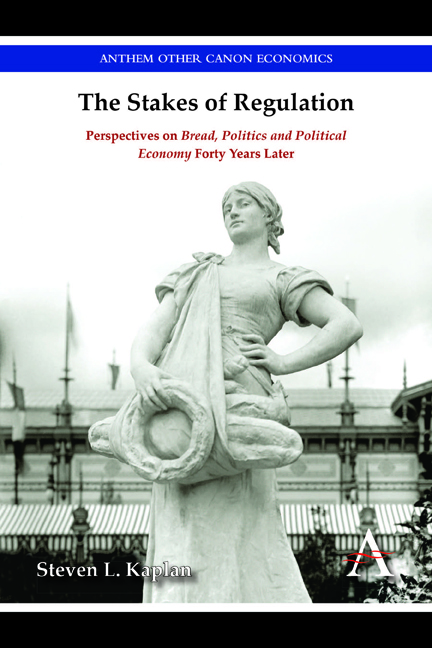Book contents
- Frontmatter
- Dedication
- Contents
- Introduction
- Chapter I (Re-)Thinking Regulation: Police, Prices, Markets
- Chapter II Agriculture and the French Economy of the Old Regime
- Chapter III Collective Action and Its Actors: The Moral Economy and the Market, the People and the Elites, Disorder and Order
- Chapter IV The Parlements in the Age of Economic Enlightenment
- Chapter V Kings and Ministers: Politics and Policies, Finance and Subsistence
- Chapter VI The New Historiography of Political Economy
- Chapter VII Famine, Dearth and Food (In-)Security
- Afterword
- Index
Afterword
Published online by Cambridge University Press: 20 July 2018
- Frontmatter
- Dedication
- Contents
- Introduction
- Chapter I (Re-)Thinking Regulation: Police, Prices, Markets
- Chapter II Agriculture and the French Economy of the Old Regime
- Chapter III Collective Action and Its Actors: The Moral Economy and the Market, the People and the Elites, Disorder and Order
- Chapter IV The Parlements in the Age of Economic Enlightenment
- Chapter V Kings and Ministers: Politics and Policies, Finance and Subsistence
- Chapter VI The New Historiography of Political Economy
- Chapter VII Famine, Dearth and Food (In-)Security
- Afterword
- Index
Summary
We're just a freezing cold bit of rock up here in the north, but we always had one thing that the other countries didn't have. A certain equality. A certain fairness. But now we're busy wrecking it for ourselves.
—Jo Nesbø, The Son (2014)While economics is about how people make choice [sic], sociology is about how they don't have any choice to make.
—Attributed to Bertrand Russell, among others.Purgatory is the promise of hope.
—Jacques Le GoffThe eminent historian R. R. Palmer, with whom I worked first as an undergraduate and then a graduate student at two different institutions, was not enamored of French historians. Yet, to judge by his affection for this aphorism, which he attributed to them, they got at least one idea right: comparaison was not raison. Palmer himself practiced comparative history brilliantly and soberly, but he warned his students tirelessly against confusing comparison with proof and exhorted us to be extremely vigilant in the use of analogies, notably between past and present, always a high-risk exercise. Alert historians are allergic to reductionism, linearity and sophism, among other things, and they know that association is not causality (or intimation of guilt), that cultural genealogy is not paternity and that consumption (of ideas, for example) is simultaneously production and reappropriation, again blurring relations of etiology and even of “influence” (a lever as subtle as it is insidious). Still, historians are understandably interested in connection, redolence, continuity/discontinuity, claimed kinship, common idiom and tonality, shared referents and representations, lineage of values, constructs of identity and affinity, clues of all sorts however (apparently) remote or elliptical. Much of what we do involves not only integrating disparate elements, but also bringing them closer to each other and to us, a rapprochement that is often ventured with a view toward seeing more clearly rather than reconciling discordance or aligning with a point of view.
None of this is simple, save perhaps for journalists, especially in online and audio-visual media, who bombard us daily with extravagant and irresponsible analogies linking today's putative perfidies and/or prodigies with fascism, communism, the Holocaust, Yalta, Munich, the reign of terror, the Stasi, the Dark Ages, Athens and Sparta, the Inquisition, apartheid, the Sputnik moment, religion in all guises, oil, the American Revolution and so on.
- Type
- Chapter
- Information
- The Stakes of RegulationPerspectives on Bread, Politics and Political Economy Forty Years Later, pp. 385 - 400Publisher: Anthem PressPrint publication year: 2015



